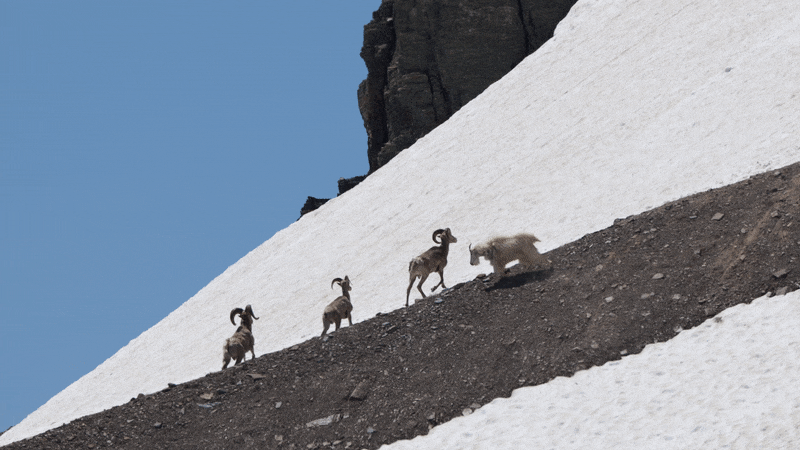
Peering through a spotting scope in Montana’s Rocky Mountains, conservation ecologist Joel Berger and his doctoral student Forest Hayes saw something strange. On a barren ridge a mile away, a bunch of mountain goats and bighorn sheep were loitering around “these wet little muddy spots,” Berger recalls. “It’s very unusual to see them together like that.”
The two researchers had no idea what the animals were doing, and their perplexity increased as they watched a male goat approach a group of sheep. The goat lowered his head at the sheep in an aggressive gesture, and before he could make contact, “the sheep move off pretty rapidly,” Berger recounts. “Goats have these saberlike horns that even sheep probably know are not good.”
Curiosity piqued, Berger and Hayes decided to investigate these apparent interspecies tensions further. After they spent days sitting out in the alpine cold and wind, watching mountain goats aggressively approach and drive off bighorn sheep through binoculars and spotting scopes, they had their answer: the animals were competing over mineral deposits in the “muddy spots” that are made accessible as mountain glaciers melt away.
In a study describing their findings, published on Monday in Frontiers of Ecology and Evolution, the researchers hypothesize that such interspecies conflicts could become more common as climate change affects the availability of patchy abiotic resources such as minerals, water and snow. “Most of the public thinks in terms of what climate extremes do to us,” says Berger, a professor at Colorado State University and a senior scientist at the Wildlife Conservation Society. “But different species of animals are dealing with this, too. And conflict may be intensifying as a consequence of the radical climate issues the planet is dealing with.”
Conflict between animals, like conflict between people, can take the form of “blood and guts” spilled in combat, Berger notes. But it also manifests as competition over resources, another type of conflict that drives ecological relationships. Conflict between animals of the same species is a commonly studied phenomenon, but much less is known about hostilities between species. Berger says this lack of baseline data is especially problematic for any researchers hoping to understand the nuances of climate change’s current and future impacts on wildlife.
To start filling in the unknowns, Berger, Hayes and their co-author Mark Biel of Glacier National Park in Montana first exhaustively reviewed decades’ worth of studies to find documented examples of conflicts between nonhuman animal species. They focused on extreme landscapes such as mountains, the Arctic and deserts—environments where resources are scarce even in the best of times and where, in many cases, climate change is already having a pronounced effect.
The researchers found around two dozen examples. These included feral horses chasing pronghorns, mule deer and bighorn sheep away from water holes in the American West; of black rhino driving gemsbok (a type of antelope) out of shady spots in the desert in Namibia; and of domestic yak dominating takin (a large ungulate) over mineral deposits in the Himalayas of Bhutan. Not surprisingly, when push comes to shove over limited resources, the researchers found that larger-bodied animals tend to win.
Bighorn sheep and mountain goats are similarly sized. But in field studies, Berger and his colleagues found that the goats almost always win. At three alpine field sites—Caw Ridge in Alberta, Glacier National Park and Mount Evans in Colorado—they observed more than 120 run-ins between goats and sheep in which one of the two animals was driven away by the other. These showdowns were primarily over mineral licks, which are deposits of salts and other essential minerals that some animals use to supplement their diet. The goats initiated every encounter and were the victors 98 percent of the time. Usually the sheep walked away or skedaddled before any physical altercation actually broke out. Like kids fleeing a playground from an aggressive bully who approaches with his fists raised, “in the case of the bighorn sheep, they did not actually need to be hit by the mountain goats to get the clear message,” Berger says.
Rather than leading to any simple conclusion, Berger says, these findings demonstrate the complexities of trying to understand and conserve species in a changing world. Road-building projects have destroyed many lower-elevation mineral licks that mountain goats, bighorn sheep and other species previously depended on. So in a way, it’s a positive development that receding glaciers are opening up new resources and habitats. Given that these new resources are limited and patchy, however, there will be winners and losers when it comes to access. In this case, the goats are the clear winners—a finding that involves further complications because mountain goats are not native to Colorado and some other states. Wildlife officials deliberately introduced them decades ago to provide a new revenue stream from sales of hunting licenses.
The challenge for wildlife managers is to weigh the facts and decide what action, if any, they should take to help mitigate anthropogenic impacts—including from development, invasive species and climate change—on the animals they wish to protect. Managers could consider adding artificial salt licks to places that lack them, for example, or exterminating goats in areas where they were introduced. For scientists, Berger adds, his team’s new research is a call to action to fill in the many unknowns that could help inform those decisions.
“This fascinating report should be the catalyst for a burgeoning field of study—namely, how the changing climate stimulates interactions among species,” says Joanna Lambert, a wildlife ecologist at the University of Colorado–Boulder, who was not involved in the new study. “There are no baselines here, and if we wish to document change, we need starting points. These three biologists do just that.”
